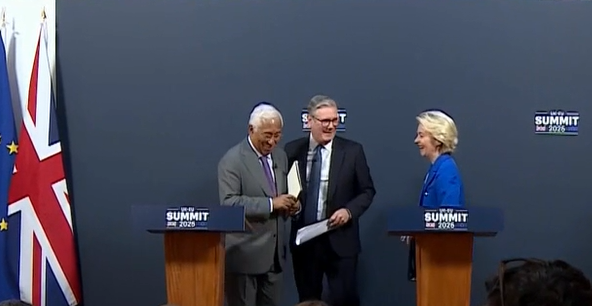UK-EU deal will ‘slash red tape and bureaucracy’
Sara White, Editor, Business & Accountancy Daily
UK strikes defence and fishing deal with EU, signals urgency to finish negotiations to reduce red tape at borders for exporters, visa-based travel scheme for young people and access to eGates at EU airports
The majority of the plans are still at the negotiation stage, with no timeline set out for conclusions of the talks, but a consensus that the priority is to achieve agreement as soon as possible.
At a joint press conference with EU leaders, the prime minister Keir Starmer stressed that this was not a case of rejoining the single market and the customs union, and was not a return to free movement of people.
‘The UK is back on the world stage. Today we have struck this landmark deal with the EU, a new partnership between an independent Britain and our allies in Europe,’ said Starmer.
‘This is the first EU-UK Summit, and it marks a new era in our relationship, and this deal is a win-win. It gives us unprecedented access to the EU market, the best of any country outside the EU or EFTA.’
The food and agricultural deal will make trade and food cheaper in the UK, Starmer said, by ‘slashing red tape and bureaucracy’.
While a timetable for the final agreement is still up in the air, the government’s priority is to fast-track the negotiations.
‘If you focus seriously on deliverables then you can make a huge difference to our country. We rolled up our sleeves, we were deliberate and pragmatic, and delivered for our country,’ said Starmer.
At final sign-off are the defence and fishing elements of the agreement. Defence is at the heart of the new agreement, with security of the continent at risk as Ukraine war enters a third year.
There is a 12-year deal to provide access to fishing rights, which will allow fishers access to each others’ markets, while UK fishers will be able to sell shellfish to the EU, which is currently banned, marking a major turnaround as the current deal was soon to expire.
Antonio Costa, president of the European Council, said: ‘The agreements we have reached today mark not just progress but a new chapter – a new and strengthened strategic partnership. Over the last months we have worked tirelessly to restore trust.
‘The United Kingdom and European Union are stronger when we stand together.
‘This will be just the first of many meetings. From now on the UK and European Union will meet once a year.’
The final agreement will include a reduction in cross-border red tape for agricultural exports and imports with a new agreement on agri exports, potential access to the EU electricity market, and an exemption on net zero payments to reduce bills for business.
This will see closer co-operation on emissions by linking the two UK and EU Emissions Trading Systems to improve the UK’s energy security and avoid businesses being hit by the EU’s carbon tax due to come in next year, which would have cost UK businesses £800m a year.
There is also a plan to allow UK passport holders to use eGates at EU airports ‘where appropriate’, according to the joint statement ‘renewed agenda’ issued by the UK and EU leaders.
‘We are confirming that all those huge queues at passport control will be over – people will be able to use eGates in EU – but it depends on individual countries to cooperate,’ said Starmer. This will be negotiated in a later phase, although clearly this would be welcome as soon as possible for many holidaymakers and business travellers.
Currently EU citizens can use eGates when arriving in the UK, and the plan is to implement the same treatment for UK arrivals to EU countries, to stop the horrendous queues experienced at immigration at European airports.
The EU-UK statement indicates that ‘there will be no legal barriers to eGate use for British Nationals traveling to and from EU member states after the introduction of the EU Entry/Exit System’.
For young people, there are plans for a visa based work experience scheme for young people to allow them to work and volunteer across the UK and EU member states will be introduced, described as Erasmus Plus, by Ursula von der Leyen, European Commission president. The numbers of people able to sign up for the scheme will be capped, Starmer said.
Von der Leyen said: ‘We are sovereign nations, we are allies – this is a new beginning for old friends. We are working towards friendly cooperation.’
This sentiment was echoed by Starmer. ‘We are building and working on a new understanding, not to return to the single market, not to return to the customs union, but to turn to a new chapter,’ he said.
In terms of the timetable for final agreement, Starmer added: ‘We came to government just 10 months ago and started last autumn on what we wanted to achieve from this summit. That is real progress at pace.
‘Our joint instruction to our negotiating team is for them to work forward at the same pace.’
The security and defence partnership will see closer cooperation between the UK and EU, and longer term it looks like the UK will become a member of the EU’s newly agreed SAFE [Security Action for Europe) defence fund framework.
This is a £105bn EU defence fund and giving the UK access to this will be wrapped up with procurement, giving UK defence contractors access to EU tenders with an annual EU financial contribution to be negotiated.
On the timing for finalising the defence stability agreement, Von der Leyen confirmed that EU member states were all on board with the fund. ‘We have negotiated SAFE and now all the countries have signed up. It is a question of only I hope a few weeks and then we should be there,’ she said.
The defence and fishing elements of the agreement have been signed off, but the remainder of the issues are still being negotiated.
Future negotiations will also look to allow the UK to access the EU electricity grid, remove customs duties on steel and increase agricultural exports through the creation of a ‘common sanitary and phytosanitary area’, to be known as the SPS agreement.
The SPS Agreement would result in the ‘vast majority of movements of animals, animal products, plants, and plant products between Great Britain and the European Union being undertaken without the certificates or controls that are currently required by the rules within the scope of the SPS Agreement for such movements’, according to the statement issued by the UK and EU.
These same benefits would be extended to the movements between Great Britain and Northern Ireland, through the interplay of the Windsor Framework and the SPS Agreement, so long as the SPS Agreement is fully implemented.
This would involve the ‘timely dynamic alignment of the rules’ of the EU across GB to maintain same food safety and animal husbandry standards in line with EU regulations.
The aim to make the SPS Agreement subject to a dispute resolution mechanism with an independent arbitration panel with ultimate oversight by the Court of Justice of the European Union (CJEU) as ‘the ultimate authority for all questions of European Union law’.
The UK would also have access to EU agencies, systems and databases covered by the SPS Agreement, with an ‘appropriate financial contribution by the UK’.







